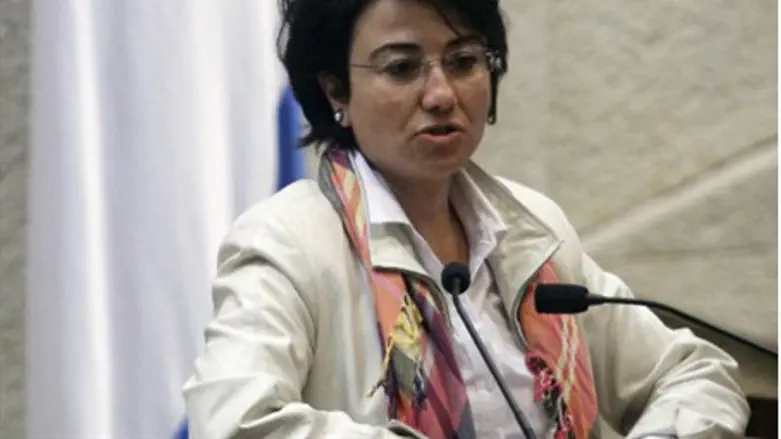
Israel should “prepare the prisons” if a law requiring Arab Israelis to enlist in the army is passed, MK Hanin Zoabi (Balad) told Arutz Sheva on Monday.
What has become known as “equal burden” in IDF and national service has become a hot issue in the coalition negotiations currently underway. While most of the attention has been on army enlistment of hareidi-religious yeshiva students, there have also been calls to include Arab Israelis in this as well. These calls have come from Yair Lapid’s Yesh Atid party but also from United Torah Judaism and Yisrael Beytenu, which advocates that everyone be drafted at the age of 18.
According to MK Zoabi, however, Arab youth would rather go to jail or perform some form of civil service than enlist in the IDF. She also said that the entire Arab sector will resort to civil disobedience in the event that such legislation is passed.
“Let's be honest,” she told Arutz Sheva. “No one wants Arabs to serve in the army, not me as an Arab and not you as Jews, and that’s the first difference between us and the hareidim. If I am not obligated to perform military service than any alternative is senseless and has no integrity. If the law does not require me to perform military service it also cannot force me to perform national service.”
Zoabi claimed that the Arab public “does not want to be part of an occupying army. The issue of the military is not just a matter of burden but also of belonging. This is internal Jewish solidarity. You cannot tell me to come in and feel as though I belong in this army.”
She added that the Bedouin and Druze also do not enlist in the army willingly, but because of needs of livelihood and as a result of the poverty in which many of them live.
“Military service is not a matter of a burden, but something that goes against our identity, against our history and culture,” said Zoabi. “You cannot copy the debate between the secular and the hareidim to the debate between Jews and Arabs. The hareidi man says he appreciates the army but his Torah is his profession. He says he has a different role in building the Jewish identity of the state.”
Zoabi identified with the anti-Zionist Neturei Karta Jews, saying, “They are anti-Zionist and I am anti-Zionist. I identify with them.”
She said that the IDF is not an army of defense but a military of occupation and oppression, and said that the mandatory military service should be cancelled, turning military service into a volunteer position. Zoabi said that she opposes having Arabs volunteer for national service if it is tied to them expressing loyalty to the state.
If legislation is passed that would require 18-year-old Arabs to serve, she said, “We will announce that there is civil disobedience. You should start building the prisons, because our entire youth will prefer to sit in prison rather than serve.”
She claimed that a recent survey conducted among young people in the Arab sector revealed that 78 percent of them are opposed to being recruited service, 12 percent agree to serve and that 10 percent do not know the plan in question and do not have an opinion.
“We oppose this law and we will not obey it,” Zoabi stated unequivocally.
Before the last elections, the Central Elections Committee banned Zoabi, who has been notorious for her anti-Israel statements and actions which included participation in the 2010 flotilla to Gaza, from running. The Committee banned her under a clause requiring candidates and parties not to work against Israel's character as a Jewish, democratic state.
However, the Supreme Court later overturned the decision and allowed Zoabi to run.
MK Danny Danon (Likud), one of the leaders in the efforts to disqualify Zoabi from the Knesset, has already submitted his first proposed law of the new Knesset – a bill dubbed “Zoabi’s law” that would have kept Zoabi out of parliament.
The proposed bill would allow the Elections Committee to bar a candidate or party from participating in elections for Knesset with just a two-thirds majority. The candidate or party would then have 30 days to appeal to the Supreme Court.
